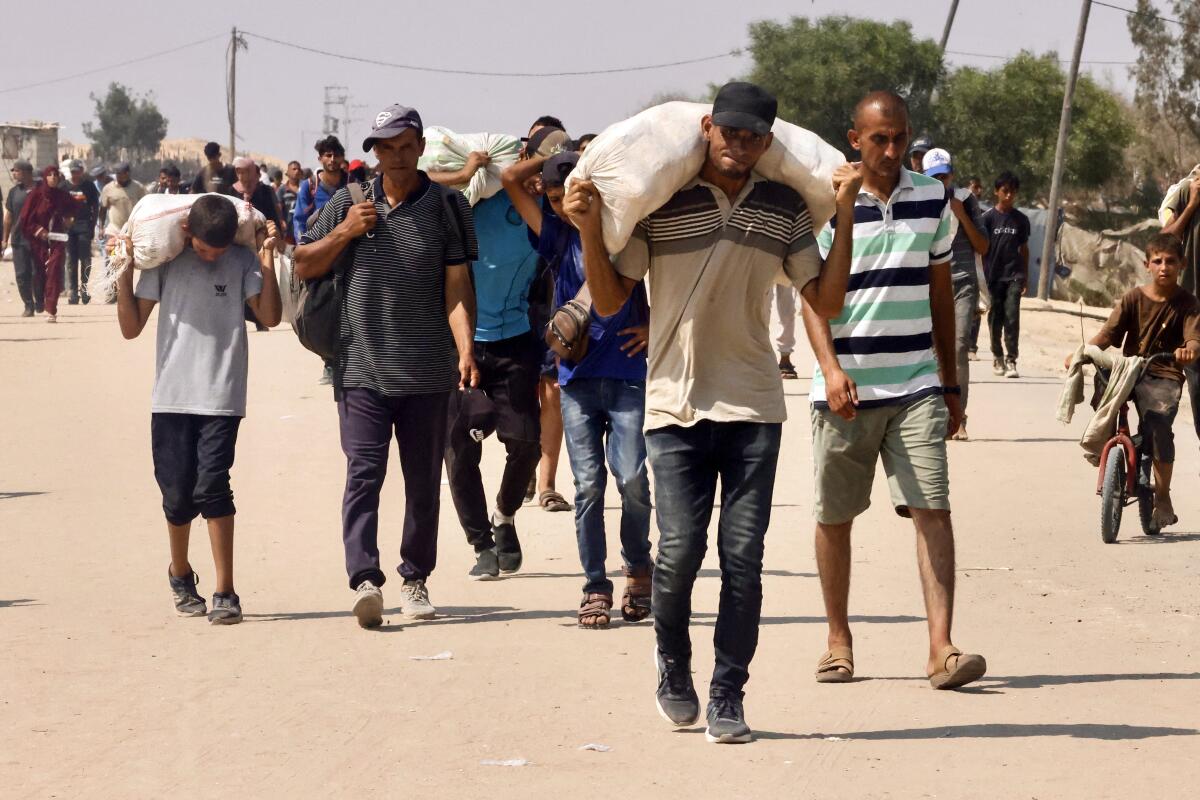DEIR AL BALAH, Gaza — Like “Squid Game.” That’s how residents describe it, invoking the dystopian TV present when recounting the deadly gauntlet that getting assist in famine-haunted Gaza has turn into.
“It’s a death race. The faster, the stronger, the luckier — they’re the ones who might survive, might reach the food,” stated 30-year-old Mohammed al-Shaqra.
“It feels like we’re ... Read More
DEIR AL BALAH, Gaza — Like “Squid Game.” That’s how residents describe it, invoking the dystopian TV present when recounting the deadly gauntlet that getting assist in famine-haunted Gaza has turn into.
“It’s a death race. The faster, the stronger, the luckier — they’re the ones who might survive, might reach the food,” stated 30-year-old Mohammed al-Shaqra.
“It feels like we’re animals, racing for a box of supplies as if our lives depend on it. And they do.”
Ever since Israel sidelined the United Nations and different humanitarian organizations late final month and tasked help operations to the Gaza Humanitarian Basis, an opaque U.S. and Israeli-backed non-public contractor registered in Delaware, killing has been the near-daily companion of assist deliveries.
On Thursday, well being authorities in Gaza stated 12 individuals had been killed close to a GHF distribution middle, a comparatively low toll in per week that noticed 59 killed in related circumstances on Tuesday. For the reason that basis started its work on Might 26, greater than 400 individuals have been killed and greater than 3,000 wounded.
Al-Shaqra grew to become one among casualties this month.
On June 8, he gathered with 1000’s of others early within the morning close to the GHF middle within the southern Gaza metropolis of Rafa. It was his third try to get meals.
“I was desperate to bring something back — flour, rice, pasta, anything — for my parents, my siblings and their kids,” he stated.
When the passageway to the distribution middle opened, Al-Shaqra sprinted as quick as he might, hoping to beat others within the crowd and seize a field. However then an Israeli quadcopter drone — it had been buzzing above beforehand — began dropping explosives; the third bomb landed near him, he stated.
Mohammed al-Shaqra receives medical remedy inside a tented clinic at Nasser Hospital in Rafah, Gaza, on June 12. He says he had gone to gather meals parcels from a Gaza Humanitarian Basis distribution middle when an Israeli quadcopter dropped explosives.
(Bilal Shbeir / For The Instances)
“My left arm shattered. I looked down and saw the bone hanging, and there was a sharp pain in my guts,” he stated. Cradling his arm and making an attempt to cease bleeding from his abdomen, he stumbled for nearly half a mile earlier than collapsing onto a donkey cart. A sort driver took him to a subject hospital for the Worldwide Group of the Crimson Cross. The docs saved his arm.
The GHF got here on-line two months after Israel reduce off all assist getting into into Gaza in March, justifying the blockade — regardless of widespread opprobrium — as a method to stress Hamas into releasing hostages at the same time as Palestinian authorities and assist teams reported a hunger disaster.
Though the U.N. and humanitarian organizations pleaded for entry to feed the roughly 2 million individuals within the Gaza Strip, Israel insisted Hamas was stealing assist, a declare the U.N. and different teams deny and for which Israel has by no means offered proof. The choice, the Israeli authorities stated, could be the GHF.

Palestinians flock to the help middle arrange by the U.S.- and Israeli-led Gaza Humanitarian Basis in Sudaniya, an space north of Gaza Metropolis, Gaza, on Tuesday.
(Saeed M. M. T. Jaras / Anadolu / Getty Pictures)
However the GHF was controversial from the outset, a lot in order that it first choose as government director stop earlier than assist deliveries even started, saying the inspiration’s plan couldn’t be carried out with out “breaching humanitarian principles.” Boston Consulting Group, which helped design the distribution system, terminated its contract with the GHF earlier this month and fired two companions concerned with the undertaking.
As a substitute of utilizing humanitarian employees, the GHF has deployed armed non-public contractors with the Israeli army stationed solely 100 yards or so away. It additionally concentrated assist deliveries to what the GHF calls 4 “fortified” hubs in southern Gaza reasonably than the roughly 400 smaller facilities utilized by the U.N. and different assist teams throughout the enclave — forcing already hungry individuals to stroll for miles by way of lively fight zones to entry the deliveries.

Palestinians carry meals and different assist from the Gaza Humanitarian Basis in Rafah, Gaza. Hungry individuals have needed to stroll for miles by way of lively fight zones to entry the deliveries.
(Abdel Kareem Hana / Related Press)
Gaza residents additionally complain just one or two hubs are often working on any given day, and barely open on the introduced time. It’s additionally by no means said what’s within the meals bins. And reasonably than instantly handing the bins to individuals, GHF employees as an alternative dump them on pallets and watch crowds swarm over them. Individuals collect hours prematurely on secure routes designated by the Israeli army, however typically discover themselves underneath Israeli fireplace when allowed to method the hubs.
“It’s a real-life version of ‘Squid Game.’ We run, then the shooting starts, we hit the ground and stay still so we’re not killed, then run again,” stated Hussein Nizar, a resident who repeatedly tried to get assist, even after his neighbor Ameen Sameer was shot within the head.
“I watched him die beside me,” he stated. “I couldn’t do anything to help out because of all the shooting.”

Ahmed Abu Daqqa, a former barber, receives remedy at a tented clinic at Nasser Hospital in Rafah, Gaza, on June 12. He was shot beside his proper eye close to a Gaza Humanitarian Basis distribution level. The bullet fractured his cranium and broke his nostril.
(Bilal Shbeir / For the Instances)
The Israeli army has repeatedly responded to questions on killings close to GHF websites by saying it will look into reviews of civilian casualties. In a earlier incident, it stated troops fired on individuals approaching them in a threatening method.
A number of Palestinians and a GHF spokesman — who gave his identify as Majed — stated lots of the shootings happen when individuals run past the bounds of the secure route in an try to get to the distribution website quicker.
Even when they’re not wounded or killed, many go residence empty-handed, stated Jassim, a 28-year-old logistics employee employed by a neighborhood contractor working with the GHF.
“Decent people, especially the elderly and women with children, can’t fight through the crowds,” he stated. He added that gangs additionally stalk individuals leaving the supply space in order to rob them and promote the dear provides on the black market.
“Many of them carry knives. It’s like a trap and I see many people killed.”
When Al-Shaqra regained consciousness, he discovered himself in Nasser Hospital, ready for surgical procedure in rooms already overflowing with different casualties from that day’s assaults on the GHF middle. Amongst them was his father, Wadee al-Shaqra, who was injured by a bullet that tore by way of the facet of his stomach.

Palestinians who had been injured by Israeli fireplace as they gathered close to a meals assist middle await care on a bloodied flooring at Nasser Hospital within the southern Gaza Strip on Tuesday.
(AFP / Getty Pictures)
Wadee misplaced monitor of his son after he was shot, however discovered him hours later, by coincidence, in a single of some tents arrange close to Nasser Hospital for convalescing sufferers.
“I thought he was killed. I was so happy to see him I didn’t ask if he got any food. I didn’t care,” Wadee stated. He added that he and Al-Shaqra went to the hubs regardless of the hazard as a result of they didn’t have sufficient bread to share amongst his grandchildren.
“We’re supposed to protect them,” he stated. “We’re risking our lives just to keep them from starving.”
The GHF says its efforts have been a hit, touting its supply of just about 26 million “meals” within the 22 days because it began operations. However with nearly half 1,000,000 individuals going through catastrophic ranges of starvation and the whole inhabitants contending with acute meals safety, based on the Built-in Meals Safety Section Classification, the deliveries quantity to roughly 0.6 meals per particular person.
The GHF doesn’t elaborate on the way it defines a meal, nevertheless it has beforehand said that it calculated day by day rations at 1,750 energy, properly under the two,200 energy goal utilized by humanitarian organizations. (Majed stated latest assist deliveries present 2,500-calorie provisions.)
The bedlam accompanying GHF’s distribution practices, assist employees say, was solely predictable.

Palestinians carry a wounded man after he and others headed to a Gaza Humanitarian Basis assist website had been attacked by Israeli forces close to the Sudaniya space in Gaza on Tuesday.
(Saeed M. M. T. Jaras / Anadolu / Getty Pictures)
“Delivery of humanitarian aid can be a very straightforward operation, but it’s a complex one,” stated Juliette Touma, communications director for the U.N. company for Palestinians, UNRWA.
She added that UNRWA and different teams have a long time of expertise serving Palestinians, with complete registry lists and an orderly distribution system that assigns appointments at conveniently positioned facilities. The GHF assist, comprising largely dry items, corresponding to pasta or lentils, requires gasoline and water to cook dinner, each of that are exhausting to acquire in Gaza. GHF assist additionally doesn’t embrace hygiene and cleansing provides, she stated — a necessary requirement.
“There’s this sheer arrogance that the U.N. and humanitarians can be replaced — just like that — by a third party, a private security company. It’s not at all like that,” she stated. “Let us do our job.”
Saleem al-Najili, a 33-year-old nurse on the UK-Med Area Hospital in Deir al Balah, now dreads GHF supply occasions.
“Every time the GHF center opens its doors, I know what’s coming,” he stated.
“It means more blood and screaming, more impossible decisions on whom we can treat. And fewer people we can actually save.”
Shbeir, a Instances particular correspondent, reported from Deir al Balah. Instances workers author Bulos reported from Beirut.
... Read LessThis is the chat box description.






